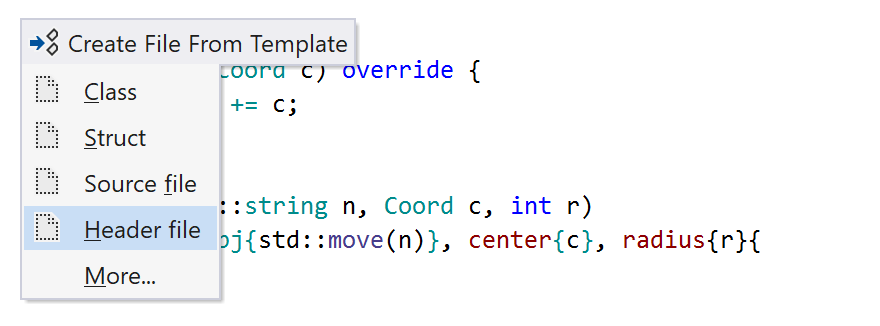Code Templates in TypeScript
Most of ReSharper's code template features are also supported in TypeScript. You can find the detailed information on these features in the corresponding topics of the Code templates section.
Live Templates
Live/Surround templates can be used for generating code in existing files and (if there is the $SELECTION$ parameter in the template body) for surrounding code fragments with template code, such as try...catch statement.
Each live template is identified by a Shortcut — a short string of characters, for example foreach — that you can type right in the editor to invoke the template.
ReSharper provides plenty of predefined live templates. You can also create custom live templates in the dedicated editor or right from existing source code.
File Templates
File templates are used to create one or more new files with predefined code, such as a type declaration, unit test, and so on. File templates have no shortcuts, they are identified by their descriptions. See Create files from templates and Create multi-file templates for details.
A file template can create more than one file when you apply the template. This may be helpful when related data is saved in different files.
There are predefined templates for class, struct, source file and header file. You can also create new file and multi-file templates .

Postfix Templates
Postfix templates help you transform expressions that you have already typed without jumping backwards — just type a dot after an expression and pick a template from the completion list.
Below is the list of postfix templates available in C++.
Shortcut | Description | Example |
|---|---|---|
.beg..end | Produces iterators from range |
|
.Cast | Surrounds expression with UE cast |
|
.cbeg..cend | Produces iterators from range |
|
.co_await | Passes expression as argument to co_await |
|
.co_return | Returns expression from current coroutine |
|
.co_yield | Passes expression as argument to co_yield |
|
.const_cast | Surrounds expression with const_cast |
|
.do | Iterating until boolean expression becomes 'false' |
|
.dynamic_cast | Surrounds expression with dynamic_cast |
|
.else | Checks boolean expression to be 'false' |
|
.foreach | Iterates over range |
|
.forward | Forwards function parameter |
|
.if | Checks boolean expression to be 'true' |
|
.make_shared | Constructs an object and wraps it in a std::shared_ptr |
|
.make_unique | Constructs an object and wraps it in a std::unique_ptr |
|
.new | Produces instantiation expression for type |
|
.reinterpret_cast | Surrounds expression with reinterpret_cast |
|
.return | Returns expression from current function |
|
.safe_cast | Surrounds expression with safe_cast (C++/CLI) |
|
.static_cast | Surrounds expression with static_cast |
|
.switch | Produces switch over integral/enum type |
|
.var | Introduces variable for expression |
|
.while | Iterating while boolean expression is 'true' |
|